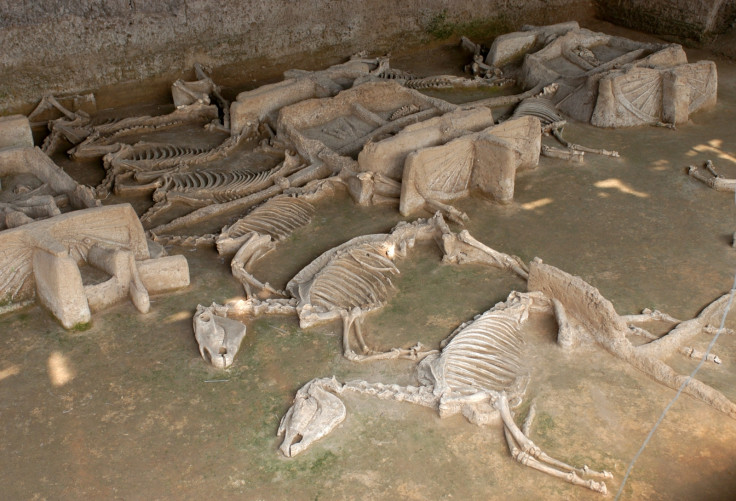Soup for the soul? Ancient Chinese ritual tureen and bowls discovered in Zhou dynasty-era tomb
Two wine vessels were also found among the remains and could have been used as part of a funerary ritual.
My personal fav of the food vessels found in the 3,100 year-old tomb in China. This tureen, a vessel that can serve soup, has 192 spikes on it and 24 images showing bovine heads. story link https://t.co/WSijBkAlmp pic.twitter.com/aMgNvqlYdw
— Owen Jarus (@ojarus) December 12, 2017
An archaeological team in China has discovered an ancient tomb filled with an assortment of bronze vessels, dating back 3,100 years. The burial site was discovered in Baoji City in Shaanxi province, an area that previously stood as the capital of the Zhou dynasty.
Led by archaeologist Zhankui Wang of the Shaanxi Provincial Institute of Archaeology, the research team found a heavily decomposed body along with bronze soup bowls and a "four-handled tureen" decorated with dragons, birds, heads of bovines and 192 spikes. There were also two wine vessels, each in the shape of a deer were part of the collection.
Ancient Tomb Full of 'Soup Bowls' & Food Vessels Discovered in China https://t.co/KGquBlKOGN pic.twitter.com/aP2FxNkJV0
— Live Science (@LiveScience) December 12, 2017
"The occupant of Tomb M4 [the name archaeologists gave the tomb] was most likely of elite status, and could potentially be a high ranking chief or the spouse of a chief," the team mentions in an article published in the journal Chinese Cultural Relics.
Archaeologists believe the items found may have been the spoils of war considering the Zhou people were in conflict with a rival dynasty at the time. "After conquering the Shang dynasty, the Zhou king distributed the plundered war spoils to the military officers with great achievements, and these spoils usually included bronze vessels," the research article mentions. Some of the vessels still hold inscriptions of names of different Shang clans.
The different clan names "on the bronze vessels suggest that they are originally from multiple clans of the Shang people," the archaeologists write in the journal article. The dishes are also believed to be "ritual vessels" used to serve food, as part of the funerary rites of the dead.
M4 was not a stand-alone tomb but part of a larger necropolis discovered by Wang's team. More than 56 other sites have been found in the area since excavations began in 2012, according to Live Science.







